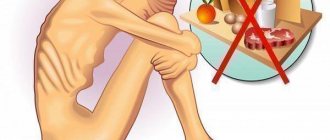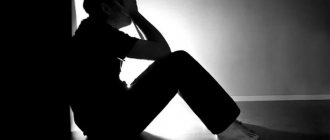With prolonged exposure to a stressful situation, nervous excitability increases. When a person goes to bed, he begins to be tormented by anxious thoughts. Insomnia (insomnia) gradually develops. To prevent the consequences of chronic sleep deprivation, you need to learn how to calm down before bed and fall asleep. Advice from psychotherapists, relaxation methods and herbal remedies will help. In case of severe mental disorders, you cannot do without medication and the help of a specialist. Doctors prescribe medications based on the patient’s condition.
When should you take the pills?
It is necessary to organize medication intake when symptoms of nervous tension remain, even if all the negative phenomena have ended.
Similar symptoms include:
- Asomnia or short sleep. If you have difficulty falling asleep, frequent awakenings in the middle of the night, or waking up too early.
- Greater irritability, groundless aggression, increased excitability.
- Difficulty with appetite. For example, an absolute refusal to eat or, conversely, eating an excessive amount of sweets.
- The advent or repetition of bad habits - an attraction to smoking, alcohol, itching of the skin.
- Loss of interest in life, reluctance to pursue a hobby or work, apathy towards everything.
- Lack of strength, physical weakness, headaches, nausea, low blood pressure.
- Tearfulness, self-pity.
Quite often, people look for a cure for stress and depression in order to get rid of them by taking one pill. However, not all drugs can immediately restore mental composure. Ideally, the medication should be prescribed by a specialist. If the patient selects the pills himself, you will need to study the information and contraindications.
Psychologist's advice
Relaxation techniques are effective when they directly target the cause of high tension before bed.
Visualization: Imagine something that calms you down
- The technique of forgiveness
allows you to relieve increased anxiety associated with grievances and unjustified expectations. A sincere desire to let go and allow each person to be themselves, refusing to control the actions of others, forgiving oneself for some misdeeds (happens to everyone!) frees the body and mind from old blocks. You may need to perform this technique more than once to get results. - Technique for liberating consciousness.
This exercise is effective if you need to stop the endless cycle of thoughts that prevents you from falling asleep. You need to close your eyes, try to relax and imagine how thoughts, like clouds, float past your head. To do it correctly will help to realize that we ourselves decide what to think about and what not to think about. - Visualization is
a simple way to distract yourself from heavy thoughts that prevent you from falling asleep. You need to get ready for bed, lie down comfortably, close your eyes and imagine something very pleasant for yourself. For example, a garden with flowering trees or little puppies playing at your feet, the light that comes from heaven cleanses and fills you with strength and tranquility. If you feel heavy, imagine yourself on the top of a mountain: a white light cloud descends from above, washes away all the heaviness from the body, taking it for itself, and flies down to rain, then the next cloud... until a feeling of purity and lightness comes. - Meditations.
You can find a large number of audio recordings freely available on the Internet that are created specifically to harmonize consciousness and eliminate the causes of insomnia.
Other methods: remote constellations, holotropic breathing, NLP, various techniques that combine these areas help not only to identify the problem, but also to eliminate it.
Types of drugs
All stress and nerve medications are a huge group of medications that affect the function of the nervous system.
According to their pharmacological effects, they are divided into:
- Neuroleptics are a class of drugs that are prescribed for neuroses, as they provoke inhibition of the central nervous system. They have a sedative, soporific effect and relax muscles. Admission is associated with side effects.
- Antidepressants are drugs that fight depression. Signs of depression include lack of mood, suicidal thoughts, and disordered thought processes. Antidepressants help cope with these symptoms, but also have a number of negative effects.
- Tranquilizers are substances that should only be taken under the supervision of a physician. By pacifying a person’s emotions, pills help relieve anxiety, fear, and free oneself from phobias, although they can be addictive.
- Nootropics are drugs that improve blood circulation in the brain and restore nerve fibers. Medicines improve mood and prevent depression. You can drink it to normalize brain function.
- Sedatives are sedatives made from natural ingredients. The composition contains mint, valerian, motherwort. They relieve nervous tension, have a relaxing effect, and do not cause drowsiness.
Insomnia with depression - why does it happen?
It sounds paradoxical, but depression is accompanied by excessive activation of the nervous system. In addition to changes in higher nervous activity and the appearance of anxiety and obsessive thoughts, an imbalance also occurs in endocrine regulation - the amount of stress hormones in the blood increases during depression. Developing changes lead to the so-called desynchronosis - a disruption of human circadian rhythms, which ensure the normal functioning of all organs and systems in a 24-hour mode.
Under such conditions, it is quite difficult, and sometimes even impossible, for the nervous system to move from a state of wakefulness to sleep. It becomes difficult for a person to fall asleep not only in the evening, but also after night awakenings, which appear more and more often against the background of depression.
Over time, an obsessive “fear of not falling asleep” appears, which provokes even greater disorders of circadian regulation and, accordingly, aggravates sleep disorders.
Progressive manifestations of insomnia cause irritability, decreased attention, high blood pressure and diseases of the digestive tract. Scientific research has even found a connection between chronic sleep disorders and the risk of malignant tumors. Many mechanisms of disorders have not yet been fully established, but the relationship between insomnia and somatic diseases is undeniable.
How to get rid of bad mood and depression
While there is no quick, one-time solution to treating depression, the following tips may help.
Create structure for your day
Lack of planned activities and inconsistency can contribute to a feeling of helplessness and loss of control over the events of your life and its aspirations. Planning regains control of the self and allows you to get rid of the feeling that you are just an inert participant in your life.
The following guide will help you create structure and evaluate whether you are managing your time optimally. Buy a notebook in which you write 5 columns:
- Time of day. You need to write down data in your diary a couple of times a day: immediately after waking up, late in the morning, before lunch, in the evening, before resting at night.
- What do you intend to do?
- What did you actually do?
- How do you feel about what you accomplished? Describe your feelings in a few words and rate them from 1 to 10.
- Situations and thoughts that can negatively affect your mood. Complete at the end of the day.
Tony Robbins' 90 Second Rule
Motivational presenter Tony Robbins believes that most people like to suffer, be depressed or apathetic. We are subject to anger, loneliness, boredom, confusion and much more only because we think (albeit subconsciously) that this will allow us to cope with the situation or pressure.
Robbins is convinced that it only takes 90 seconds to pinpoint a problem. This is what needs to be done.
- Determine which types of suffering have become your favorite. It is necessary to be as sincere as possible and answer this question boldly (and it would be good to be alone so that there is no temptation to defend yourself).
- Notice the thoughts that initiate torment and realize that external moments essentially do not have the slightest meaning. For example, thoughts about money can drive even a tycoon crazy. We become who we imagine ourselves to be. Thinking about finances and their lack seems to whisper to your consciousness, “You are poor and unhappy.” By focusing on them, you are only making the problem worse.
- Decide firmly that you are ready to get out of depression and control your thoughts. The point is that we are not making a clear decision, and in all likelihood we are not doing anything to solve it. As soon as an irrevocable decision has been made, as soon as you have categorically decided to bring yourself back to normal, only then can you start treatment.
- Even if all your projects collapse and the worst imaginable situation comes to fruition, this should not push you into the abyss of depression. You can't control 99% of the situations in your life, but you can control how you think and feel about it.
- Calm your breathing. Drop your shoulders. Feel how negative thoughts float through you without causing any damage to your psyche.
Robbins testifies that for him the 90-second rule was originally a 4-hour or 4-day rule. With experience, you will learn to bring yourself back to normal in a matter of moments and prevent depression.
The Stoic Method
The Stoics practiced mental exercises that trained their psyche. One of their best practices is to imagine the worst-case scenario. This does not mean believing, but it means reconciling.
If you could be fired from your job and you haven’t slept at night for a month, finally come to terms with this possibility and stop torturing yourself. Tell yourself, “Okay, I'm ready for this.” Once you do this, you will feel relief. Work through alternatives. Now if you get fired, you will know what you will do next. If you don’t get fired, you can move on with your life just fine.
The most important thing in this exercise is to relieve the tension that has accumulated in you and let go of the situation.
Gratitude Skill
Gratitude has a powerful therapeutic effect. Depression often occurs due to regrets about the past or fears about the future. When you are grateful, you are present and aware of how much you have now.
Instill this habit in yourself. There is nothing more effective than developing it immediately after waking up and before going to bed. When you wake up in the morning, take 10 minutes to remember what you have. The best thing to do is keep yourself a gratitude journal. Also try throughout the day to notice what you forgot to mention in the morning. And finally, the evening ritual. Go to sleep thinking about what you have. Staying in a state of gratitude for a long time automatically relieves you of regrets, fears and worries. Gratitude has an incredible ennobling effect on a person.
Exercise before bed
Corpse pose
There are many gymnastics for starting the day and ending it. The more active the exercise, the longer the gap between exercise and going to bed should be. Some techniques can be used while lying in bed. For example, "
corpse pose
."
No matter how funny its name may sound, at the end of a hard day of work this exercise is indeed very effective.
All you need to do is lie comfortably on your back and relax. It will take a little time to relieve tension from all muscles:
- first relax your feet, then your calves, thighs;
- feel your hands fill with warmth, your arms and shoulders become heavy and relax;
- after that you need to calm the muscles of the abdomen, chest, neck, filling them with warmth;
- last of all, the muscles of the forehead, around the mouth, eyes, and cheeks relax. If this is not easy, you should stroke these parts of the body with your palm and completely relax again.
Yoga is a great pre-bedtime activity. One of the complexes, “Eye of Revival,” is perfect for daily practice and takes only 15 minutes. The morning part of the complex concentrates energy, while the evening part calms and promotes relaxation of the whole body.
"Inhale-exhale." This simple technique will help you achieve results in just 1 minute. To perform it, you need to tense all the muscles of the body while inhaling, stay in this state, and while exhaling slowly, relax. Do as many times as necessary.











